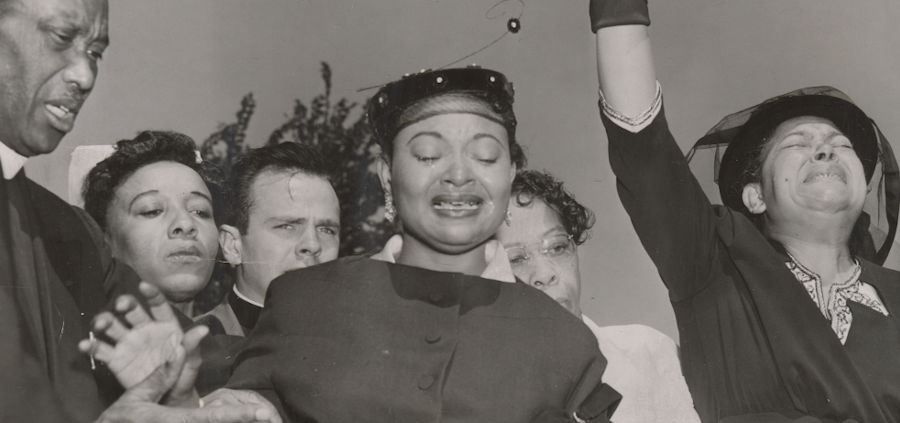Mother of Sorrows by Chris Byrd
Till
Directed by Chinonye Chukwu
Written by Michael Reilly, Keith Beauchamp, and Chinonye Chukwu
Orion/United Artists Releasing
PG-13 2 hours, 10 minutes
Emmett Till was lynched and murdered in Money, Mississippi, in August 1955. Visiting family, the 14-year-old Black Chicago boy was attacked for brazenly whistling at 21-year-old white grocery store clerk named Carolyn Bryant. Spurring Rosa Park’s famous refusal to give up her bus seat to a white man in Montgomery, Alabama, on December 1, 1955, Till’s death catalyzed the civil rights movement.
Anchored by Danielle Deadwyler’s magnificent SAG and Critics’ Choice award–nominated performance as Emmet’s mother, Mamie, the important and timely film Till recounts a mother’s pursuit of justice for her son and evolution as an activist.
The first Black American to win the Sundance Film Festival’s U.S. Dramatic Grand Jury Prize for directing 2019’s Clemency, Nigerian-born Chinonye Chukwu helms Till, which she cowrote with Michael Reilly and Keith Beauchamp.
The film’s outstanding prologue quickly establishes the mother and son’s affectionate and strong bond as Mamie and Emmet, played by Jalyn Hall, sing along to The Moonglows’ 1955 hit “Sincerely.” The prologue also effectively showcases Emmett’s personality, anticipating what will happen—and what will be lost to the world.
Known to the family as “Bo,” Emmett overcomes a stutter induced by a polio bout by signing along with commercials. Favoring cuff links, he’s also a clotheshorse. He was a “cocky self-assured boy who loved to be the center of attention,” as Marcia Smith and David C. Taylor write in Stanley Nelson’s powerful yet succinct documentary The Murder of Emmett Till.
Acutely mindful of how he is, Mamie admonishes her son before his Mississippi trip: “They have a different set of rules for Negroes down there. You can’t risk looking at them [whites] the wrong way.”
Forgetting his mother’s counsel, Emmett enters Bryant’s Grocery and Meat Market to purchase some gum and tells the cashier Carolyn (Haley Bennett): “You look like a movie star.” Departing the store, the Northerner whistles at the woman.
Avenging his wife, Roy Bryant (Sean Michael Weber) and his half brother J. W. Milam (Eric Whitten) kidnap Emmett from his great-uncle sharecropper Moses’s (John Douglas Thompson) house on August 28, 1955. Three days later, his defaced, rotting body is discovered in the Tallahatchie River, weighted down by a 75-pound cotton gin fan and barbed wire.
Thanks to Deadwyler’s portrayal, Mamie’s reactions to the news of Bo’s death and encountering his body upon his return to Chicago will remain seared in the viewer’s consciousness. “Raw” and “palpable” don’t sufficiently describe the sense of a mother’s anguish that viewers experience through her.
Mamie directed her grief into action that changed the nation’s history as well as her own. When her future husband, Gene Mobley (Sean Patrick Thomas), tells Mamie that Bo is in no shape to be viewed, she says, “He’s in just the right shape. The whole world has to see what happened to my son.”
Photos of mother and son as Mamie intended him to be seen were published in the September 15, 1955, edition of Jet magazine. The photos outraged the nation’s conscience. These unflinching, audacious images compelled 50,000 mourners to view Emmett’s open casket at Chicago’s Roberts Temple Church of God in Christ in November 1955.
Bryant and Milam’s murder trial ends predictably with acquittals. But as NAACP attorney Rayfield Mooty (Kevin Carroll) reminds Mamie, “To get a murder indictment on two white men in Mississippi is not easy.”
Mamie and Moses’s bold trial testimony was also unprecedented. When the sharecropper rises from the witness stand to finger the defendants, viewers may think Hollywood is taking license, but the portrayal is true to what happened.
After they were paid $4,000 for their story by Look magazine, Bryant and Milam confessed to the murder the following year. Carolyn Bryant, however, hasn’t been held accountable for her role in Emmett’s death. Emmett’s family recently demanded Leflore County Sheriff Ricky Banks serve an unserved warrant from 1955 for Carolyn’s arrest, after a grand jury didn’t indict the octogenarian based upon the same evidence last year when the warrant was discovered.
The Till family maintains Mamie’s activism. In the film, she’s initially unconcerned with the plight of Southern Blacks, but at a Harlem rally soon after the trial, she says, “What happens to any of us anywhere in the world better be the business of us all.”
Ultimately, Till is a story of a mother’s profound, abiding love for her son. You can’t watch the film without thinking of George Floyd and Tyre Nichols. in their great distress, they naturally called out for their mothers, representing the intimate yet painful connection that Mamie Till knew, and that too many Black mothers still know all too well. ♦
Chris Byrd writes from Washington, D.C. His work has appeared in America, Sojourners, and the National Catholic Reporter.





Leave a Reply
Want to join the discussion?Feel free to contribute!